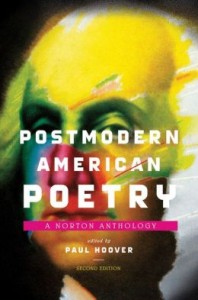Random
The Nation Versus The Norton Postmodern Anthology Disaster (2nd Edition)

RE: Postmodern American Poetry: A Norton Anthology (2nd Edition) / Edited by Paul Hoover / W.W. Norton & Co., March 2013
***
Anthologies serve a plainly economic purpose, if nothing else. Pedagogical too…most teachers and students of poetry—along with its general lovers everywhere—lack the time and/or wherewithal to go out and find so many individual titles on their own. This new Norton edition via Paul Hoover, generously upgraded since the first in 1994, writes Conceptual and Flarf poetry into a Postmodern American narrative that has become desperate for extensions. None of the poets here come off as desperate; the blanket labeling is merely academic. Once outside the classroom it feels very old-hat. But as poet and critic Ange Mlinko pointed out in her already notorious review of this book for The Nation, under what other aesthetic banner can a major publisher have the Zen nature verses of Gary Snyder together with K. Silem Mohammad’s rewritings of Shakespeare via an internet anagram generator?
It’s only been a couple of months since the anthology came out, and already there is a scandal in the works. Poets dig war. The politics/poetics of who gets left in, and who gets taken out, or who gets tacked on to the end remains an uninteresting mystery. Pop outliers like Charles Bukowski have been left out this time around, but the more high-profile writers of the Beat Generation, New York School 1st & 2nd generation(s), Black Mountain Poets and Language School are all given their due throughout these pages, once again. If you don’t know what any of those are, this book will no doubt be indispensable to you. Now the same goes for Conceptualism and Flarf. Flarf has never had its own private anthology (maybe on purpose?) while Conceptualism decidedly has, with Against Expression: An Anthology of Conceptual Writing just two years ago. Nevertheless, of all the poetry groupings/movements in this book, these two are still the most involved in the business of constantly redefining themselves before a potential public.


Enter the scandal: Ange Mlinko, recipient of the Randall Jarrell Award in Poetry Criticism from the Poetry Foundation, a lyric-ish poet with New York School leanings and several full-length books to her name (née 1969, ten years older than the youngest poet at the end of Hoover’s selection, Ben Lerner) has issued a grandmotherly rallying cry against the obscenity of these two “incoherent and dispiriting” contemporary poetry movements. Poets Catherine Wagner, Sharon Mesmer and Vanessa Place sustain the most damage. Mlinko’s argument is, how can the single mother/father working three jobs at a Chick-fil-A whilst getting their MFA in poetry in Modest, Wisconsin possibly get traditional inspiration and their tuition’s worth when they’ve been assigned this edition as the go-to postmodern textbook? Reading celebrity orgies with Mel Gibson and Saddam Hussein as Poetry? A poem called “Dies: A Sentence” that’s admittedly hard to read!? Every Flarf/Conceptual poet I’ve met has been quick to argue the contrary. Those Wisconsin proletariat are probably the ones who get the biggest kick out of the experimentation; as anyone alive today can intuitively understand how it forms an undeniable reflection of the times. This is not to rule out the possibility of rebel neo-Elizabethan court lady Chick-fil-A employees, naturally together digging The Norton Anthology Of Classical Literature on their lunch break.
Perhaps the real moral of the story is that the term “postmodern textbook” is an oxymoron, thus the bizarre preponderance of these poets making it into Ivy League academia, which Mlinko also points out. There can be no postmodern anthology. Anthologies are like headphones: the planned obsolescence is built-in by Norton. That said, anyone who feels they side with Mlinko on this one will need a subscription to The Nation, or a way to hack around their online paywall, to read her article in its native habitat.
It didn’t get much more contemporary than Flarf in 2005, the deadliest year for American soldiers stationed in Iraq since that war started (we won, right?) and the year the search for weapons of mass destruction supposedly came to an end. It was also the year of Flarfiste Drew Gardner’s second book Petroleum Hat, with the protest poem “Chicks Dig War”:
with two-fisted truth
before changing clothes
by portraying war as
chicks digging the phones of war.
Phallocentric chicks:
they dig guys with big wars.
I just cannot, you know, believe in a war
against chicks when they’ve got the anti-chick war
thing goin’ on.
The women will be like “Ooh, what a cute war!”
It’s odd, because I swear I’ve read Ange Mlinko near-proselytizing about Flarf somewhere before too…Paul Hoover introduces Gardner’s work in this anthology with a quote from her positive blurb for Petroleum Hat: “[It’s] natural language for a country at war. Unlike the old model of protest poetry, Drew Gardner isn’t interested in earnest appeals to reason and compassion. He’ll match the political spectacle absurdity for absurdity—and in the case of the funny and chilling ‘Chicks Dig War,’ I’m struck by how thoroughly he understands the logic of our times.” Just weeks before this anthology came out however, on her Twitter feed, Mlinko wrote that she was “patiently waiting for Flarf to enter the dustbin of history”! That’s a complete 180 of critical opinion if I ever heard one.
The anthologies with true staying power are always those that present a fairly cogent aesthetic statement altogether. Need I say Donald Allen’s The New American Poetry 1945 – 1960, which was cogent, so far as it boldly opposed the New Criticism. The Best American Poetry, year after year, comes nowhere close to such a feat. Neither does the Oxford American, the collections from Garrison Keillor, Poets For the New Millennium has other goals in mind, etcetera. Flarf and Conceptualism are two examples of the latest in poetry that especially resists the concept of “close reading” or the work of art as a hermetic entirety in and of itself alone. It’s too easy to take Mlinko’s recent position, one espousing censorship and conservation as opposed to “[a] patchwork of incommensurable, often vulgar and nihilistic styles,” viz.: the variety that is actually happening in poetry now. Flarf is no prairie home companion, that’s for sure, but Mlinko’s diagnosis for The Nation feels like the voice of 1950s New Criticism back from the dead.
***
Ben Tripp is at work on a new illuminated chapbook (artwork by Jake Braff) based off his poem “I Pawn My iPod”. It will be available everywhere soon, directions here: http://benjamintripp.
Tags: Ange Mlinko, Ben Tripp, Norton, Postmodern American Poetry

Anthologies are made by academics for use in academia. The best way to get into an anthology is to be employed as an academic. I haven’t looked at this new anthology but I would be interested to know how many people in it have never drawn a paycheck from a university.
To me, one of the coolest things about the Roggenbuck/alt lit poetry movement is that it is not beholden to academia and is not being written by people gunning for jobs as professors. Finally, poetry’s long-term monogamous relationship with academia and the resultant lesbian bed death may be ending.
Yeah, I’m sure all those “academics” who write creatively do so just so they can compete with 100 other people for an asst. professor job that pays 55K-65K a year w/ a published book and grad school into their early to mid-30s, sometimes longer. Youthful naivete at its finest.
And I’m not sure where you got the notion that anthologies are always or usually “made by academics.” That is flatout wrong, unless the only anthology you’ve ever read is the Norton.
If the anthology fails to forcibly convince every potential reader that it is the absolute standard by which the rest of the “postmodern” American poets can be gauged, then it fails to be worth anything more than ten “dollars” ($9.99 used).
“To me, one of the coolest things about the Roggenbuck/alt lit poetry movement is that it is not beholden to academia…”
Except that you can’t hear Roggenbuck’s name mentioned without it being attached to the little bio tidbit that he dropped out of an MFA program. That Columbia College Chicago is often just shortened to Columbia is I’m sure by no-means an attempt to further build legend. And how gleefully we all bask in this legend. This amazing and free rebellion against the academia! Not beholden to academia for its required ethos at all!
Indeed, we owe the great Hellenicist Prof. Dr. Fitzhugh Tumblr-Shortcake this etymology, pieced together from late antiquity’s criminally least-well-known collection of grammatical instances, The Garland of Microcephalus: ἡ ἀνθολογία: ‘definitive and last word’.
hahahahahahaha!
(I mien it.)